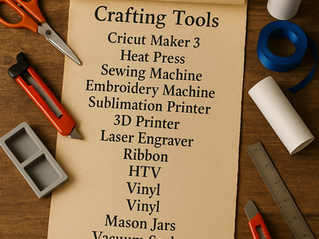The Halloween Throne That Almost Wasn’t: How I 3D Printed My Way Through a Gothic Chair Build Gone Sideways
- Crystal Wubbels
- Nov 1, 2025
- 3 min read
It All Started with Ozzy Osbourne and a Marketplace Find
The whole project began with a question to ChatGPT: “What would an Ozzy Osbourne-inspired throne look like?” From that spark came a creative experiment that spiraled—in the best way possible—into my most ambitious Halloween prop yet.

I’d found an old antique chair on Marketplace that had just the right Gothic potential. I uploaded the photo to ChatGPT, and together we brainstormed throne designs that balanced eerie elegance and rock ‘n’ roll drama. I cropped the image into individual design elements—like the lion heads and ornate top crest—and sent them through Meshy.ai to generate STL files.
From ChatGPT to Meshy.ai to Tinkercad
Meshy.ai handled the conversion beautifully. Within minutes, I had detailed 3D models ready to work with.
From there, I moved into Tinkercad to break the large designs into printable sections that my 3D printers—the Bambu A1 Mini and FlashForge—could handle. Each piece became its own little puzzle—one that I could actually make real.
Since this was only a Halloween prop, perfection wasn’t the goal—impact was. I made small edits, including hollowing out the lion heads so I could insert LED lights for glowing eyes. Those tiny touches made a big difference in the final effect.
The Oops Moments
Of course, not everything went according to plan (does it ever?). The biggest oversight: I forgot to account for the angle of the chair arms and backrest. When I went to attach my beautifully printed side panels, they didn’t align the way they had in my head—or on-screen. The top crest piece also needed some trimming and creative mounting because the back of the chair slanted backward.
For a brief moment, I considered scrapping the project altogether. But then I remembered—this was an Oops to Awesome project, not an Oops to Perfect one. So, out came the clamps, 3D glue, a few zip strips, and a little ingenuity. The final build wasn’t flawless, but it looked flawless enough to earn double takes from trick-or-treaters.

The Final Result
Once the LED lights flickered on and the throne was staged, it was pure Halloween magic. The glowing lion eyes and shadowed carvings gave it a gothic energy that even my design miscalculations couldn’t ruin. From a distance (and under dim porch lighting), it looked every bit the haunted seat of a dark monarch.
Lessons from the Throne
Account for real-world angles before committing to digital designs.
3D printing can make you feel like an engineer and a mad scientist.
“Good enough” can still be jaw-dropping.
Creative oops moments usually make the best stories.
From Oops to Awesome My Halloween Throne
This project reminded me that success isn’t about a flawless finish—it’s about learning, adapting, and finding joy in the making. My Halloween throne might not have been perfect, but it was uniquely mine, and that’s what made it awesome.
The Gear Behind the Goof:
Chair from Facebook Marketplace
Software That Made It Happen
Disclosure: This post contains affiliate links. If you click through and make a purchase, I may earn a small commission at no additional cost to you. I only recommend products I’ve personally used or believe will add value to your creative projects.
Tell me: Have you ever created something that didn’t quite go as planned but still ended up being amazing? Share your story below or tag me on Instagram with #OopsToAwesome—I’d love to see your near-misses that turned into masterpieces.







Comments